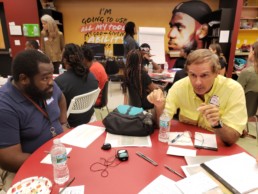“Climate Ready Miami” Resilience Strategy
Year Complete: 2019
Grant Amount: $25,000
Local Government: City of Miami, FL
Local Foundation: The Miami Foundation
Project Purpose
To align Miami’s Strategic Plan with the resilience priorities, initiatives and performance measures identified in regional resilience strategy development and the City’s updated Comprehensive Development Plan.
Key Lessons Learned
Lessons learned about tools and tactics through the project that other sustainability directors could use to advance their work.
- Outreach to residents:
- When it comes to outreach, you cannot start early enough. It’s probably not a coincidence that the best-attended meetings were the first one (which had two weeks to work on outreach) and the last two (which had a neighborhood-specific engagement strategy, and the word had gotten out about the meeting series). Plan outreach timelines allowing at least two weeks to one-month lead time for workshops.
- Take a hyper-local approach: Some neighborhoods need different kinds of outreach than others — for instance, while emails and social media worked for the wealthier neighborhood, handing out flyers in lower-income communities was most effective. Each meeting had a unique flyer with a photo representing the neighborhood and connecting them to climate change. Use existing neighborhood resources such as parks and Police Neighborhood Resource Officers to learn about local organizations and Home Owners Associations that can help us spread the word. The outreach database helped tailor future outreach.
- Follow up repeatedly:
- In advance of each meeting, aim to contact potential neighborhood outreach partners at least twice. For partners working City-wide, follow up multiple times, asking them to send out a general flyer with all the meeting dates as well as the survey. Draft a copy for outreach emails, social media posts on Facebook, Twitter, Instagram and newsletters for partners to make outreach easier. In addition, phone calls/texts confirming attendance to key individuals such as HOA presidents proved effective.
- Say thank you:
- After each meeting, send out a Constant Contact email to participants to thank them for their attendance, encourage them to stay engaged, and let them know they are valued.
- Workshops:
- Make it easy to participate: Have child care and food available at all meetings, and language interpretation services available at meetings. These services not only helped parents and participants who didn’t speak English; they also created a welcome, open environment that set the tone for the evening.
- Make it about the audience: Dedicated ample time to small group discussions.
- Provide concrete next steps: Let participants know how the input will be used.
Lessons for developing a collaborative relationship between a local government sustainability director and local place-based foundation(s)
As with any partner, it is important to understand their overall priorities, what they want to get out of the partnership, and the unique resources and capacity they can bring to the table. Be sure to say thank you in all kinds of ways – post on the city website, on flyers, in social media posts, and at meetings to participants.
Additional Information and Resources
Read more about the resilience additions to the Miami FY 2019-2021 Strategic Plan here.

